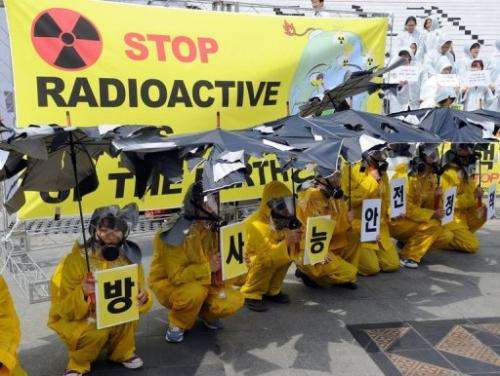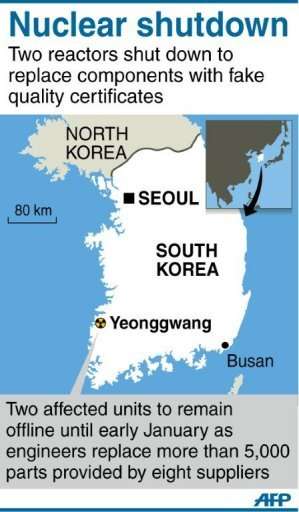S.Korea predicts power cuts as nuke reactors shut

South Korea was forced to shut down two nuclear reactors on Monday to replace components that had not been properly vetted, a minister said, warning of "unprecedented" power shortages to follow.
Knowledge Economy Minister Hong Suk-Woo said the "non-core" components posed no safety threat and were unrelated to a string of systems malfunctions at reactors this year that triggered calls for a safety review.
The two affected units at the Yeonggwang nuclear complex may remain offline until early January, as engineers replace more than 5,000 fuses, cooling fans and other parts for which suppliers had provided faked quality certificates.
"Comprehensive safety check-ups are necessary at these two reactors where the uncertified parts were used extensively," Hong said.
"It's inevitable that we will experience unprecedented power shortage during the coming winter with the two reactors shut," he added.
South Korea operates 23 nuclear power reactors which meet more than 35 percent of the country's electricity needs. It plans to build an additional 16 reactors by 2030.
Last month, authorities temporarily shut down two 1,000-megawatt reactors at separate nuclear plants after system malfunctions which were also blamed for another reactor at Yeonggwang being tripped into automatic shutdown in July.
The government has vowed to stick to its nuclear power programme despite public concerns arising from last year's nuclear disaster in Japan.

If the two Yeonggwang reactors are not brought back online as scheduled, Hong warned of a "dramatic" drop in national power reserves to 300,000 kilowatts in January, compared to the government target of 4.5 million kilowatts.
"Energy authorities are preparing a super-intense power supply emergency plan, which will be carried out in mid-November," he said, without elaborating.
All parts supplied for use in South Korea's nuclear plants require quality and safety warranties from one of 12 international organisations designated by Seoul.
Eight suppliers cited by Hong faked 60 warranties covering nearly 7,700 items that had been provided at a cost of 820 million won ($750,000), Hong said.
Of the total, more than 5,200 parts have been used in five reactors—99 percent of them in the two Yeonggwang units closed on Monday.
Hong said prosecutors would investigate the suppliers as well as possible collusion by officials of the state-run Korea Hydro and Nuclear Power (KHNP).
Doubts over nuclear safety standards were fuelled in May when five senior engineers were charged with trying to cover up a potentially dangerous power failure at South Korea's oldest nuclear plant.
The five, including a 55-year-old chief engineer at the Gori-1 reactor, were accused of violating a law on nuclear safety.
The reactor, built in 1978 near the southern city of Busan, briefly lost mains power on February 9 and the emergency generator failed to kick in. The power cut caused cooling water to stop circulating.
The Korean Federation of Environment Movement, a coalition of civic environmental groups, said the use of unvetted components suggested KHNP was cutting corners in order to source cheap supplies.
"An overall inspection on the general safety of nuclear power plants needs to be carried out," the group said in a statement.
"If this is neglected because of power shortages, there could be a terrible price to pay," it said.
(c) 2012 AFP





















